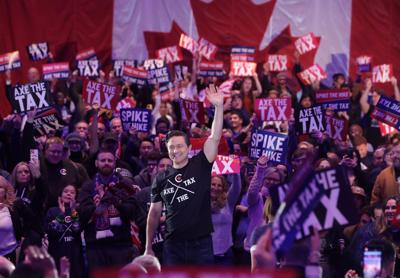The top issue facing Canadians right now, if you ask Canadians, is affordability. Inflation rose, and is falling to a new, higher floor. Housing costs are the end of the fuse on a time bomb. It’s tough out there for a lot of people. Look around.
So governments must find solutions, or at least be seen to try, and the number one topic has somehow become the carbon tax. , the opposing Conservatives say. They say “Trudeau’s carbon tax has forced Canadians to choose between heating their home and putting food on the table.” Which, uh, isnŌĆÖt true.
Nevertheless, the Conservatives have hammered this message. In Ontario, Premier Doug Ford has also linked it to affordability, and Liberal Leader Bonnie Crombie has run from the idea of a carbon tax in response. Several provinces are opposing the April 1 increase, and . (Rebates rise with the price, though in fairness, paying up front and waiting between quarterly payments - that start in April- can pinch, in harder times.)
But Pierre Poilievre’s party is driving this exhaust-spewing bus. Affordability. Axe the tax. It’s largely opportunistic nonsense, unfortunately.
“That (idea) that the Conservatives are fighting for the working class on this: I mean, you’re not,ŌĆØ says Andrew Leach, a professor of law and economics, and the co-director of the Institute for Public Economics at the University of Alberta. “You’re fighting for the people who have a material benefit from the removal of carbon pricing, which are people above that 70 per cent or 80 per cent income line. For the middle, it’s a rounding error. To the bottom, (removing the carbon tax) is a big loss.
“And they’re getting away with saying we’re doing this for the poor. And it’s insanity.”
One professor? Pfft, you might say. We can find economics professors who say the carbon tax isn’t worth the cost, and who write op-eds whose argument boils down to, uh, CO2 is good for plants.
Well, what about more than 200 Canadian economists? Because that’s how many this week addressing the main arguments against carbon pricing. That it doesn’t affect emissions, for instance. (It does, according to at least , at a lower cost than alternative approaches.) The letter also counters the arguments that the tax drives up the cost of living as a big factor in inflation, that it doesn’t make sense to offer both carbon pricing and rebates, that it harms Canadian business competitiveness, and that carbon pricing isn’t necessary at all.
The letter reads, “Healthy public debate is good, but it should be based on sound evidence and facts.”
“Any attempt to reduce greenhouse gas emissions is going to reduce economic activity,” says Stephen Gordon of the Universit├® de Laval, who, like Leach, is a signatory. “The thing about the carbon tax is it has the least bad effect on economic activity.”
Assuming a shared priority of reduced emissions in a warming world ŌĆö and it’s clear not everyone shares that view ŌĆö the letter is a reminder of why Canada chose the carbon pricing route. The letter is no wholesale endorsement of the Liberals, as . Gordon, for instance, is of their move last year to carve out home heating oil from the tax across the country.
No, this is about objective reality.
“Expertise basically goes, ‘famous expert says,’ and then the story ends there,” says Gordon. “They don’t say, why does this famous expert say this? What’s the logic, what’s the reasoning behind the argument? (This letter)┬Āis an attempt. It’s hard to do in 800 words, for people who don’t have the background, in very general terms.”
It’s perhaps worrying that the state of debate in Canada has reached the point where a huge group of experts feels the need to stage what is essentially an expertise intervention. The Liberals failed to properly explain the policy before they undercut it. The Conservatives decided to act as though the rebates don’t exist, and that evidence on the carbon tax significantly increasing inflation does. Admittedly, sometimes it’s nice to pretend.
But while something like an expert consensus is welcome, can we even properly listen to expertise anymore? Poilievre has already called some of the countryŌĆÖs leading housing experts “failed Liberal academics” when they criticized his party’s plan, and his opinions on the media is well known. And the Conservative Party is following, hard.
The Liberals, meanwhile, have been late to the game when it came to listening to expertise on, say, the collision of immigration and the housing crisis, and ended up undermining their own policy, opening the door to the growing rumblings of discontent toward Canada’s high level of much needed newcomers.
Ideally, a letter like this would be considered seriously. In a nation of big challenges, facts and expertise should be welcome. But as partisan politics leans toward ever sharper sticks, it’s hard to imagine, isn’t it? Poilievre may assail the ivory tower eggheads; the Liberals have already taken the letter as a full endorsement, which it isnŌĆÖt. Listening to nonpartisan expertise is a sign of a healthy society. Is that us?
Clarification - April 2, 2024
This article was edited from a previous version to make clear that┬Ā although the first carbon tax rebate payment starts in April, there are four payments a year.┬Ā



























To join the conversation set a first and last name in your user profile.
Sign in or register for free to join the Conversation